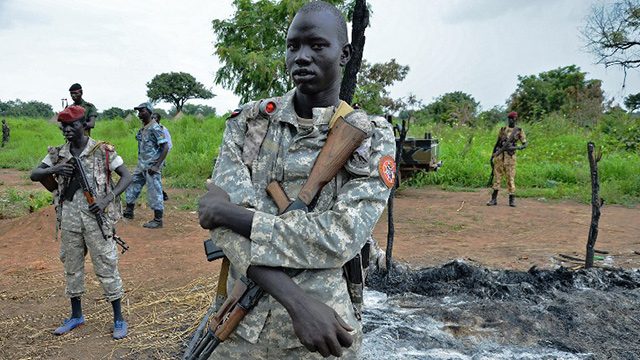SUMMARY
This is AI generated summarization, which may have errors. For context, always refer to the full article.

JUBA, South Sudan – South Sudan’s army and rebels accused each other of responsibility for fresh fighting Saturday, August 29, in the north-east despite a peace agreement to end a brutal 20-month civil war.
The renewed clashes came after the pact, brokered by the regional 8-nation IGAD bloc along with the United Nations, the African Union, China, Britain, Norway, and the United States, provided for a permanent ceasefire supposed to enter into force on Saturday.
“Riek Machar’s rebels attacked Malakal yesterday,” Friday, and the “assault on Malakal resumed this (Saturday) morning,” army spokesman Colonel Philip Aguer said at a press conference.
“That’s untrue, their forces attacked us near Malakal,” rebel spokesman James Gatdet Dak told Agence France-Presse (AFP), referring to a strategic northeastern town and a gateway to the country’s last remaining major oil fields.
“They wanted to seize the area before the ceasefire comes into effect,” he said.
It was not immediately clear if the ceasefire had entered into force on Saturday afternoon in the world’s newest nation, which broke away from Sudan four years ago. Dak said it was supposed to come into effect at midnight (2100 GMT Saturday or 5 am Sunday Philippine time).
The accord, signed by rebel leader Machar on August 17 and the government only on Wednesday, gave a 72-hour deadline for a permanent cessation of hostilities.
Aguer said the rebels attacked Malakal, the state capital of Upper Nile, overnight “using mortars and machineguns” and resumed shelling on Saturday.
He said one government soldier was wounded, adding: “Though the army is committed to the spirit of peace and welcome the internationally supported peace initiative, (it has) all the rights for self defence and for protection of Malakal town and the surrounding areas.”
Peace deal a ‘humiliation’
South Sudan’s civil war began in December 2013 when President Salva Kiir accused his former deputy Riek Machar of planning a coup, setting off a cycle of retaliatory killings across the country that has split the poverty-stricken, landlocked country along ethnic lines.
Facing the threat of international sanctions, Kiir finally signed the deal this week but annexed a list of reservations that he said would have to be addressed for the deal to take hold.
Machar, for his part, has said the reservations cast “doubts” on the government’s commitment.
The UN Security Council on Friday called for the ceasefire to begin immediately and threatened sanctions against those who undermine the accord.
Machar’s spokesman, Nyarji Roman, earlier Saturday said the former vice president had ordered his rebel troops to lay down their arms in line with the accord.
Machar “gave a declaration of a permanent ceasefire to his troops last night,” the spokesman told AFP.
Kiir’s spokesman, Ateny Wek Ateny, told AFP on Friday the president had ordered the entire army “to stop shooting and remain in their barracks where they are, but they can shoot in self-defence once attacked”.
Two powerful rebel generals, Peter Gadet and Gathoth Gatkuoth, split from Machar earlier this month, accusing him of seeking power for himself.
The government has said the split is a key reason they doubt the peace deal can be effective.
The signed deal gives the rebels the post of first vice president, which means that Machar would likely return to the job he was sacked from, an event which put the country on the path to war later that year.
But the 12-page government list of reservations on the peace deal calls this a “humiliation” and a “reward for rebellion”, and insists the post of first vice-president must be on equal footing with the current vice-president, whose post remains.
At least 7 ceasefires have already been agreed and then shattered within days or even hours.
Over two million people have fled their homes from a war marked by ethnic killings, gang rapes and child soldier recruitment. Some 200,000 terrified civilians are sheltering inside UN bases.
Under the peace deal, a “transitional government of national unity” will take office within 3 months. – Rappler.com
Add a comment
How does this make you feel?
There are no comments yet. Add your comment to start the conversation.